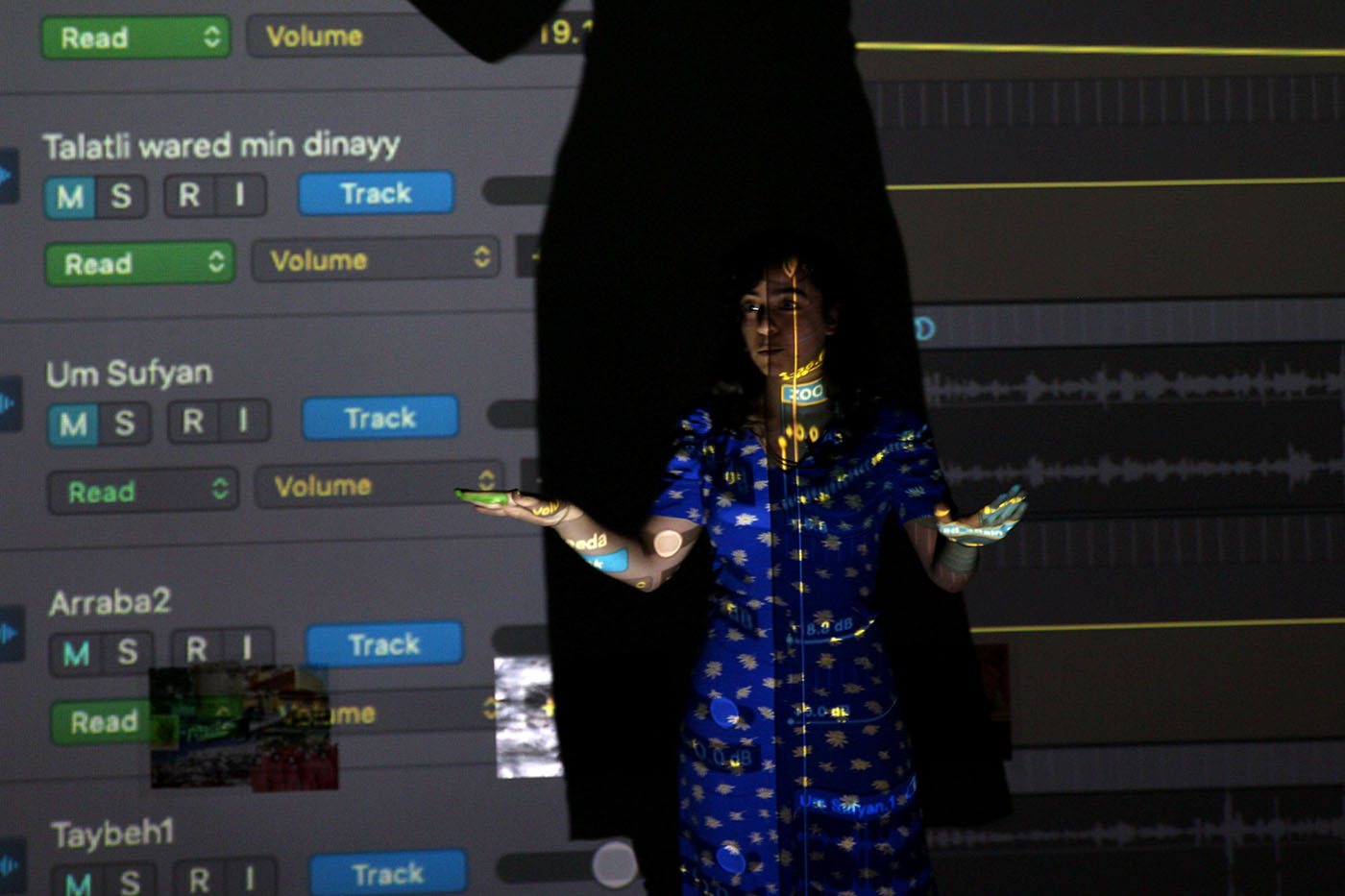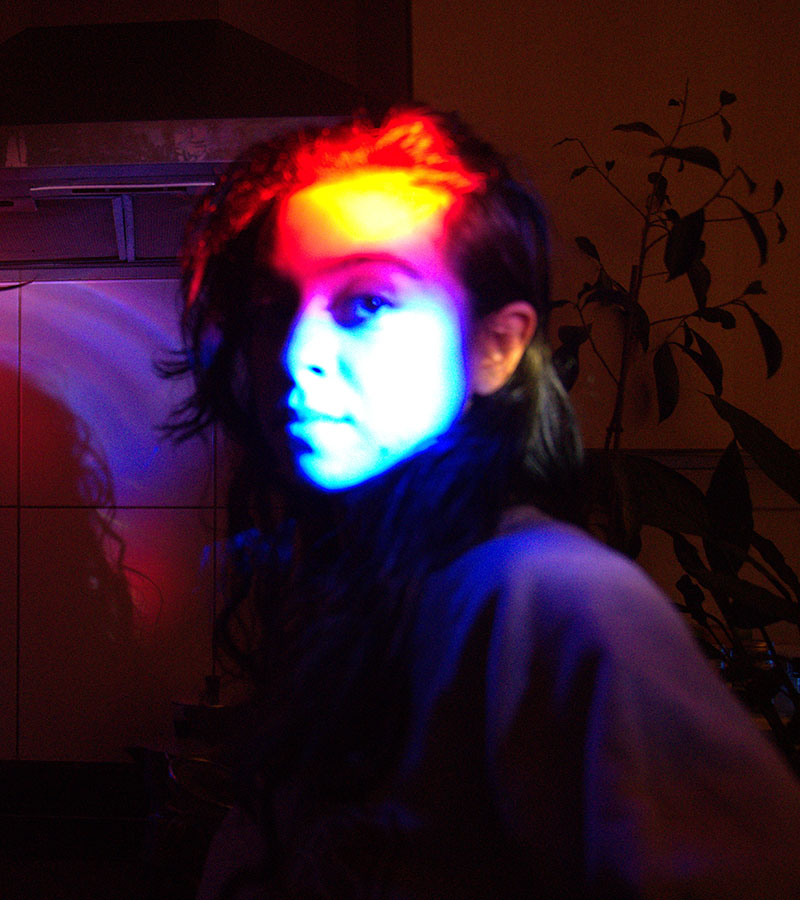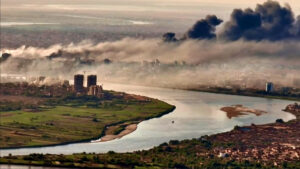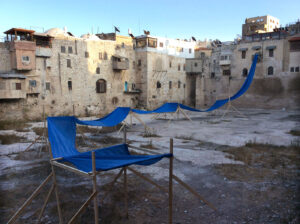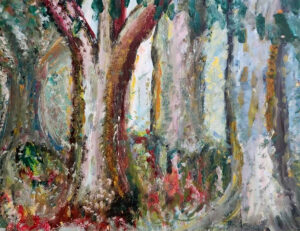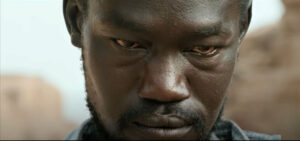A walk through London’s Hackney Marshes calls forth stories of Gaza, the Nile, the Sindhu River and the Thames.
When the Land Speaks —صوت الأرض — is a guided tour through the Hackney Marshes with sound artist and researcher Bint Mbareh; visual artist and landscape architect, Juliette Mourad; and poet and electrical engineer, Ola Elhassan, on the 9th of July, 2023, as part of the Shubbak: A Window on Contemporary Arab Cultures Festival.
Bint Mbareh
Four of us embark on a short but intensive journey across the Hackney Marshes. In our pockets are stories and figures from historical floods, which we tell to each other as we make our way. Hackney Marshes are a part of East London’s unwritten history. In corners of the internet, tales about the marshes abound. The Vikings, in the ninth century, were besieged there by a Roman viaduct that filled the flatlands with water and left the Vikings stranded and exposed between two enemy garrisons of Roman soldiers. In the Middle Ages, the Knights Templar used the marshes as pasture for their grazing animals. It’s rare to find official literature, outside Britain’s notorious tabloids, detailing raves spent in the marshes, or poems written about lovers seeking refuge from London’s bright lights and noise. These stories too are as important as facts. The four of us walk beside a seemingly calm body of water in the marshes, next to plants we don’t know the names of and plants that are threatening to cut, sting and burn us.
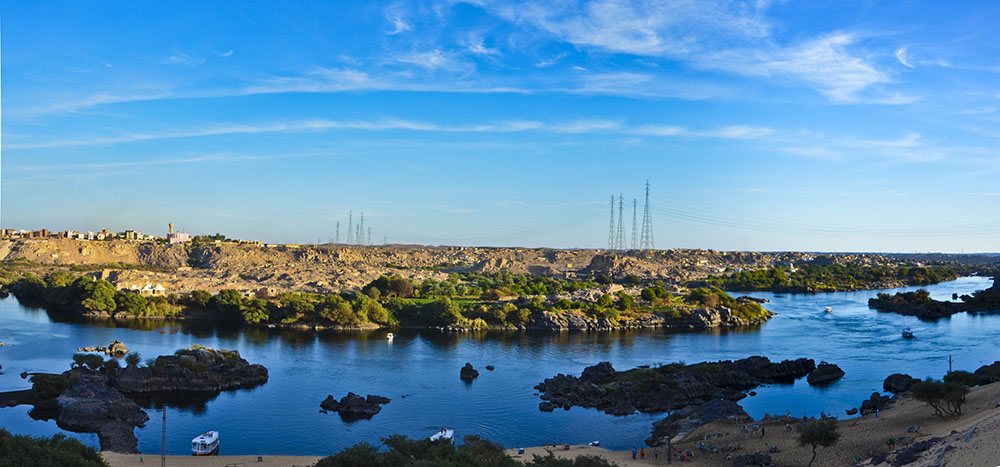
The Nile
The first of us, who is quick-paced, tells of the flooding of the Nile. She says the flooding of that river corresponds with the rising of Sirius, the brightest star in the sky, in the constellation of Canis Major. In an ancient past, before the Nile was restrained, in August of every year, the floods caused immense harm to people, cattle and villages. The Nile is still revered as a force to be reckoned with — a friend as strong if not stronger than the human communities that live alongside it. But after the flooding of the Nile returned to its course, and left in its wake a land so fertile that the people, who grew their crops on either side of it, refused to claim ownership of the river. The Nile was considered a common resource for anyone to share in its abundance. This was both an acknowledgment of the damage that the flood left behind and the fertility that grew out of that damage.
Egypt built the Aswan High Dam. In the 1980s, many Arabic commentators praised this dam as the triumphant taming of one of nature’s most powerful manifestations, the fabled river Nile. But feelings of many communities by the Nile, which had drawn their livelihoods from the river’s munificence and destructiveness, were different.
The construction of the High Dam required hard labor from the Nubian communities living nearby. As the river was dammed, Nubian homes were flooded and entire populations were paid to vacate their homes, decimating 44 villages. But what sums of money could genuinely replace the nourishment, friendship, and millennia of river history that flowed through these peoples’ lives?
Cultural historian and artist Alia Mossallam tells us about a Nubian woman she interviewed for her research on the High Dam. This woman claimed that one of the differences between living on the Nile and living in the Kom Ombo desert, to where over 40,000 Nubians had been relocated, were the ناس النيل, the Nas el Nil, or “dwellers of the Nile.” Her family would leave food and other items for these spirits, known for their kindness and generosity. In the depths of the Kom Ombo desert, the woman said that there were jinns both kind and malicious. However, they weren’t as close to her people as “the dwellers.” Floods, it seems, leave gifts. Then there are floods, which greedily wash away stories and the telling of them.
Another thought occurs to a traveler among our four. Calm water might appear soft and tender, but it’s not always like that. They remind us that throughout this winter, Gaza was flooded more violently than usual, although the purpose of recalling the floods in Gaza is not to make us feel guilty about the beauty of Hackney Marshes, but rather to remove the veil of misunderstanding that romance forces on us. They say that the Southern Gazan plains, known for its exports of red poppies, carnations, strawberries and guava, have been, for the most part, turned into breeding ground for dengue — not by their own accord but because of intentional policies on the border’s other side.
Once a seasonal stream, which fed the mountains of Hebron and their chilly grapevines, ran across the southern stretch of Palestinian land, all the way into Gaza. But Israeli water policy demanded the damming of the stream, allegedly because of water scarcity. With that, all the water was used up by colonial agriculture. On the other side of the false border in Gaza, crops died and the land became saltier and saltier.
The immediate area was then used by Gazans to solve an urgent waste crisis. Farmland previously known for its fertility was turned into a landfill for human waste. For a number of years the Israeli authorities flooded the landfill with excess water from the dam, which was opened due to flooding caused by heavy rainfall. It is a situation which proves the Israelis’ original myth of water scarcity a lie.
The situation has become insupportable; first, because stagnant water in the landfill carries pestilence and disease. Second, the area could have been used as arable land in a country where arable land is in short supply. Perhaps the third point is the most difficult. Water is a touchy subject for Gazans. The sea, once a place for play, rejuvenation and contemplation, now makes the people think of death and imprisonment. Before the hand of colonization deprived them of fresh water, they were never in need. The land had provided them with all their needs as well as a surplus every year. Now precious aquifer supplies beneath their feet are being stolen by nearby settlements. This is in addition to a fake border which restricts a vital stream that once nourished and connected all of Palestine. Water is a constant reminder of the daily hell that is the siege of Gaza.
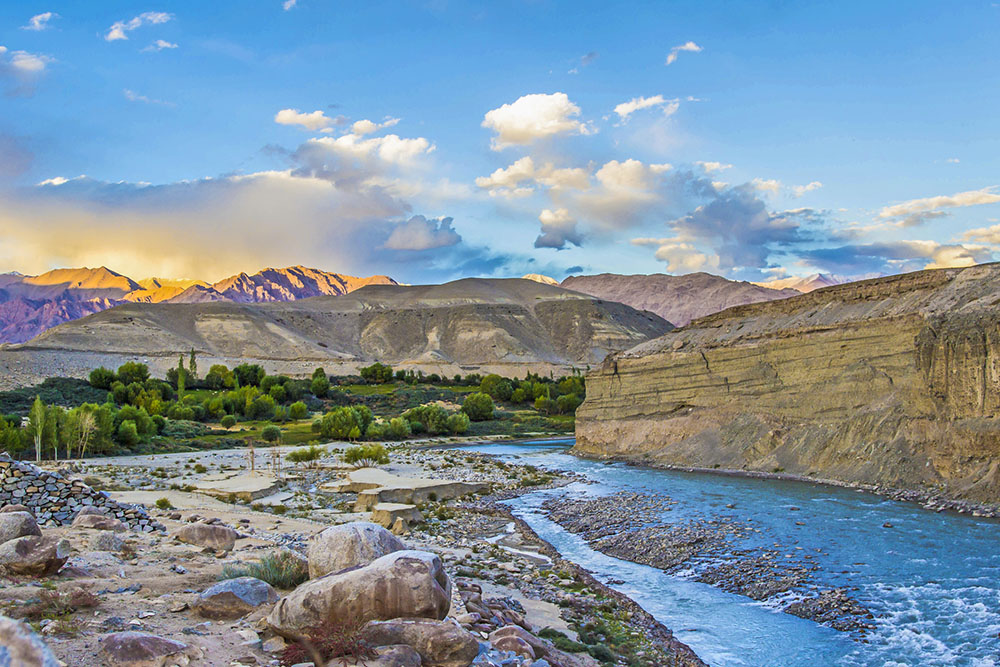
An Ancient River
We are reminded by Zahra Malkani who is walking with us: Central to the marshes are rising and falling water levels, which means the marshes never really look the same. This brings to her mind a river that predates the Himalayas. “Mehran” is one of the names of the Sindhu or Indus River. It is related to “Mehr” or “Mitr,” the ancient goddess of water and friendship — a name we will return to. The Mehran or Sindhu River flooded so heavily in Pakistan in late 2022 that entire villages were inundated. A combination of torrential rain, feeble embankments, and collapsing hills left families with nothing but stale water as far as the eye could see, in some places as deep as a one-storey building.
There are no words that can make meaning of this much death and disenfranchisement. However, there is a recurring feeling that whatever happens to the river happens to its kith and kin — the people living alongside it. One of the salient chants of the 2011 Sudanese uprising was: “We are the ones who quenched the Nile’s thirst with our flowing blood.” There is a sense that bodies of water inhabit us / that we inhabit, like the Mehran, mirror our lives to the extent that they make our lives. The process of world building through watery-scapes such as Mehran is a clear response of the people thriving beside it. In the case of those floods, neither the state, its auxiliaries nor global aid organizations came to the rescue as the river flooded and peoples’ lives were upended. It was neighbors who helped each other, which makes so much sense considering the body of water itself was often referred to as a metaphor for the communal pathway to worship and divinity. Understanding the loss and lamentation that overtook the lives of these peoples and the river itself is understood in this poem, shared by Zahra, about the floods:
We will return in every lifetime
We will meet by the sweet Mehran
We will meet by the sweet Mehran
Water landscapes are a way of knowing there are worlds — geographically and spiritually — beyond ours. They help us know the past and the future, and these are worlds we can sometimes only access by asking the water for help.
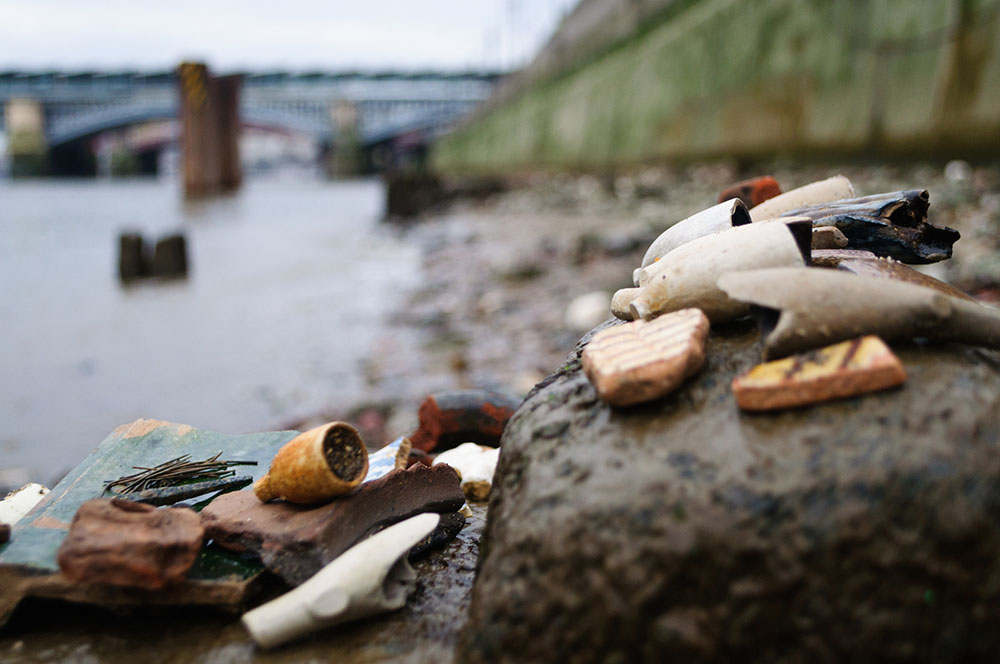
The Mudlarks
Back in the Hackney Marshes, one person on our walk explains the tradition of “mudlarking” along the Thames River. People seek out lost items, sometimes with metal detectors, in the hopes they will be valuable, along the river’s wide embankments. The Thames itself holds such treasures. The rising and falling of its tidal nature carries whatever was thrown in the river to its sides. The tides also keep the riverbanks wet, which mean very little aerobic decomposition takes place on objects beneath the soil. In effect, these objects are nearly vacuum-sealed and protected from decay.
The Thames has a natural capacity to keep its secrets and past discarded objects intact. One of these was an entire temple left behind by invading Romans — the temple of Mithras, now known as the London Mithraeum. Mithras may well be the same Indo-Persian goddess known to bring friendship and fertility and light, another name for Sindhu or Indus. In a country keen to claim sovereign Englishness as a clearly marked boundary line, the Thames, an unruly storyteller, offers an alternate narrative. London has carried stories and gods all the way from ancient Iran to its very own river.
Within the winding metropolis that is London, the Hackney Marshes offers pockets of safety for revelers who rely on marshland’s sonic qualities isolated by water and scrub. A reveler seeks to meet others, while hiding from a busy urban landscape filled with the business of intrusive interactions. For a “clandestine” rave to be successful it has to make itself known to large numbers of people. It showcases the most technologically driven musical sounds within the environs of a reverential natural landscape. As with any body of water, the marshlands mirror the communities they attract and the communities that they bind together.
For us four nomads who all speak Arabic, wandering along the banks of this frequently flooded landscape, we wonder if we can ask these marshlands to embody our own contradictions. If water has the ability to be cataclysmic, deathly, toxic, to the same extent it can nurture, compose, and gift, then surely there is no story too big for us to tell here. We decide it’s our role to make a ritual and a rite of telling secrets to the marshlands. It is likely that none of us will ever rightly “belong” to London; that the city will never carve out a space which all four of us can call “home.” But if we insist on the vulnerability and enrichment of sharing secrets with this body of water, which resembles us — and those who came before us and carried stories to it from the far corners of the earth — then there is hope for belonging, and there is hope in flooding.



